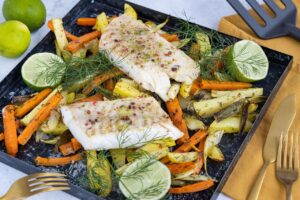When you’re in remission from Crohn’s or colitis, it’s tempting to eat whatever you want. After all, the pain and urgency are gone, and you finally feel like yourself again. But while you may have more dietary flexibility, the way you eat during remission can influence how long your symptom-free period lasts. By making smart choices, you can support gut health, maintain energy, and potentially reduce the risk of future flares.
Reintroducing Foods: Take It Slow
If you’ve been on a restricted diet due to a recent flare, reintroduce foods gradually to see how your body responds. Start with small portions and monitor any reactions. This is especially important for high-fiber foods, dairy, and raw vegetables, which may be harder to digest for some people. Keeping a food journal can help you track what works and what doesn’t.
Prioritizing Gut-Friendly Nutrients
Now is the time to focus on nutrient-dense foods that support your overall health. Prioritize:
- Lean Proteins: Chicken, fish, eggs, and tofu provide essential amino acids for muscle repair and energy.
- Healthy Fats: Olive oil, avocado, and nut butters can be easier on digestion while offering important nutrients.
- Soluble Fiber: Oatmeal, bananas, sweet potatoes, and peeled apples provide gentle fiber to support digestion without excessive roughage.
- Fermented Foods: Yogurt with live cultures, kefir, and miso can introduce beneficial bacteria to support gut health, but introduce them slowly to see if they’re well-tolerated.
Finding Your Fiber Balance
Fiber is tricky for people with IBD. While insoluble fiber (found in raw greens, nuts, and seeds) can be irritating, soluble fiber can aid digestion and help maintain regularity. Slowly incorporating fiber-rich foods like cooked vegetables, peeled fruits, and well-cooked grains can help strike the right balance.
Staying Hydrated and Avoiding Triggers
Dehydration can sneak up even in remission, so make sure to drink plenty of fluids. Water, herbal teas, and electrolyte-rich drinks are best. Many people with IBD find that alcohol, excessive caffeine, and artificial sweeteners can be triggers, so it’s wise to consume these in moderation or avoid them altogether.
Eating to Reduce Inflammation
Certain foods are thought to have anti-inflammatory properties, which may help keep symptoms at bay. These include:
- Fatty fish (salmon, tuna) for omega-3s
- Turmeric for its curcumin content
- Berries and leafy greens (if tolerated) for antioxidants
- Ginger and chamomile tea for soothing digestion
The Bottom Line
Remission doesn’t mean throwing caution to the wind—it’s an opportunity to nourish your body and maintain gut health. By eating a well-balanced, nutrient-rich diet and paying attention to your personal triggers, you can enjoy a fulfilling diet while giving yourself the best chance at keeping flares at bay. Always listen to your body and make adjustments as needed, and if you’re unsure, consult with a dietitian or healthcare provider to create a plan that works best for you.








